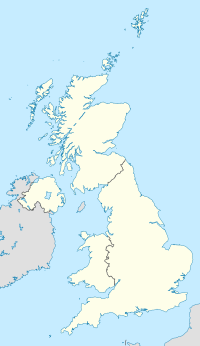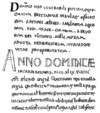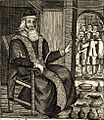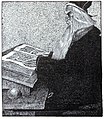Portal:United Kingdom
The United Kingdom Portal
 |
 |

| |
The United Kingdom of Great Britain and Northern Ireland, commonly known as the United Kingdom (UK) or Britain, is a country in Northwestern Europe, off the coast of the continental mainland. It comprises England, Scotland, Wales, and Northern Ireland. The UK includes the island of Great Britain, the north-eastern part of the island of Ireland, and most of the smaller islands within the British Isles, making up a total area of 94,354 square miles (244,376 km2). Northern Ireland shares a land border with the Republic of Ireland; otherwise, the United Kingdom is surrounded by the Atlantic Ocean, the North Sea, the English Channel, the Celtic Sea, and the Irish Sea. The United Kingdom had an estimated population of over 68.2 million people in 2023. The capital and largest city of both England and the United Kingdom is London, whose wider metropolitan area is the largest in Western Europe, with a population of 14.9 million. The cities of Edinburgh, Cardiff, and Belfast are the national capitals of Scotland, Wales, and Northern Ireland, respectively.
The lands of the UK have been inhabited continuously since the Neolithic. In AD 43, the Roman conquest of Britain began; the Roman departure was followed by Anglo-Saxon settlement. In 1066, the Normans conquered England. With the end of the Wars of the Roses, the English state stabilised and began to grow in power, resulting by the 16th century in the annexation of Wales, the domination of Scotland, and the establishment of the British Empire. Over the course of the 17th century, the role of the British monarchy was reduced, particularly as a result of the English Civil War. In 1707, the Kingdom of England and the Kingdom of Scotland united under the Treaty of Union to create the Kingdom of Great Britain. The Acts of Union 1800 incorporated the Kingdom of Ireland to create the United Kingdom of Great Britain and Ireland in 1801. Most of Ireland seceded from the UK in 1922 as the Irish Free State, and the Royal and Parliamentary Titles Act 1927 created the present United Kingdom.
The UK became the first industrialised country and was the world's foremost power for the majority of the 19th and early 20th centuries, particularly during the Pax Britannica between 1815 and 1914. The British Empire was the leading economic power for most of the 19th century, a position supported by its agricultural prosperity, its role as a dominant trading nation, a massive industrial capacity, significant technological achievements, and the rise of 19th-century London as the world's principal financial centre. At its height in the 1920s, the British Empire encompassed almost a quarter of the world's landmass and population, and was the largest empire in history. However, its involvement in the First World War and the Second World War damaged Britain's economic power and a global wave of decolonisation led to the independence of most British colonies. (Full article...)
Featured article
"Hey Jude" is a song attributed to Paul McCartney and John Lennon (though largely the work of McCartney), originally recorded by The Beatles for the self-titled The Beatles album, but released instead as a single. The song, despite its unusually long length (seven minutes, 12 seconds), became the Beatles' best-selling single, although they did produce a trimmed down version for American radio due to most stations' refusal to air a song of such length. The song–originally titled "Hey Jules"–was written for John Lennon's son Julian by McCartney, at a trying time for the Lennon family when John and his first wife, Cynthia, were getting divorced. The senior Lennon related to the song extremely well too, as he had just begun his relationship with his future second wife, Yoko Ono. McCartney had also just broken up with Jane Asher and was about to start seeing Linda Eastman. (Full article...)
Featured biography
Asser was a Welsh monk from St. David's, Dyfed, who became Bishop of Sherborne in the 890s. In about 885 he was asked by Alfred the Great to leave St. David's and join the circle of learned men which Alfred was recruiting for his court. After spending a year at Caerwent due to an illness, he accepted. In 893 Asser wrote a biography of Alfred, called the Life of King Alfred. The manuscript survived to modern times in only one copy, which was part of the Cotton library. That copy was destroyed in a fire in 1731, but transcriptions that had been made earlier, allied with material from Asser's work that was included by other early writers, have enabled the work to be reconstructed. The biography is now the main source of information about Alfred's life, and provides far more information about Alfred than is known about any other early English ruler. Asser also assisted Alfred in his translation of Gregory the Great's Pastoral Care, and possibly with other works. Asser is sometimes cited as a source for the legend of Alfred having founded the University of Oxford, which is now known to be false. A short passage making this claim was interpolated by William Camden into his 1603 edition of Asser's Life. Doubts have also been raised periodically about whether the entire Life is a forgery, written by a slightly later writer, but it is now almost universally accepted as genuine. (Full article...)
General images -
Subportals
WikiProjects
Things you can do
- Visit the British Wikipedians' notice board.
- The noticeboard is the central forum for information and discussion on editing related to the United Kingdom.
- Comment at the British deletion sorting page.
- This page lists deletion discussions on topics relating to the United Kingdom.
Featured pictures
Did you know -

- ... that Sting wrote "We Work the Black Seam" because he felt that "the case for coal was never put to the nation" during the 1984–85 British miners' strike, which began 40 years ago today?
- ... that a £142 wine fridge was smuggled into Downing Street on 11 December 2020, during the height of the COVID-19 lockdown in the United Kingdom?
- ... that Ed Miliband retweeted "Chaos with Ed Miliband" with a clown emoji during the October 2022 United Kingdom government crisis?
- ... that Youlgreave in Derbyshire is one of only a few villages in the United Kingdom to be supplied by its own private waterworks?
- ... that despite being an independent candidate, Leanne Mohamad came within 528 votes of defeating shadow health secretary Wes Streeting in the 2024 UK general election?
- ... that the 2023 United Kingdom student protests were organised on TikTok and Snapchat?
In the news
- 19 December 2024 – Russian invasion of Ukraine
- Military aids during the Russian invasion of Ukraine, United Kingdom and the Russian invasion of Ukraine
- 19 December 2024 – Georgia–United Kingdom relations, Georgia–United States relations, 2024 Georgian post-election protests
- The United Kingdom and the United States impose sanctions on Georgian officials, including Interior Minister Vakhtang Gomelauri, in response to alleged violent crackdowns on pro-European protests. (EFE)
- 18 December 2024 – Legal affairs of the Tate brothers
- The Westminster Magistrates' Court rules that British police may seize £2.2 million (US$2.5 million) from influencer Andrew Tate and his brother Tristan for allegedly failing to pay taxes on profits from their online ventures. (DW)
- 15 December 2024 – Free trade agreements of the United Kingdom
- The United Kingdom joins the Comprehensive and Progressive Agreement for Trans-Pacific Partnership, becoming the 12th member and the first European member. (Reuters)
- 11 December 2024 – 2024 United Kingdom farmers' protests
- Hundreds of tractors block Whitehall in protest of Labour government changes to agricultural inheritance tax. (The Independent)
- 7 December 2024 – 2024–25 European windstorm season
- Two people are killed by falling trees in England and more than 1.5 million people experience power outages in Ireland and the United Kingdom as Storm Darragh hits the British Isles. (BBC News) (Sky News)
Categories
Other UK-connected Wikipedias
Wikimedia
The following Wikimedia Foundation sister projects provide more on this subject:
-
Commons
Free media repository -
Wikibooks
Free textbooks and manuals -
Wikidata
Free knowledge base -
Wikinews
Free-content news -
Wikiquote
Collection of quotations -
Wikisource
Free-content library -
Wikiversity
Free learning tools -
Wikivoyage
Free travel guide -
Wiktionary
Dictionary and thesaurus





















































































































